We are often asked by our readers how many WordPress plugins they should install on their site. But the real question everyone wants to know is how many plugins are too many.
Since there are a lot of misconceptions about WordPress plugins and how they can impact website speed, performance, and security, we want to explain this topic in detail for our non-techy users.
In this article, we will explain how many WordPress plugins should install on your site. We will also talk about how plugins can and cannot affect your website. Our goal is to help you learn how to run your website with the perfect combination of WordPress plugins.
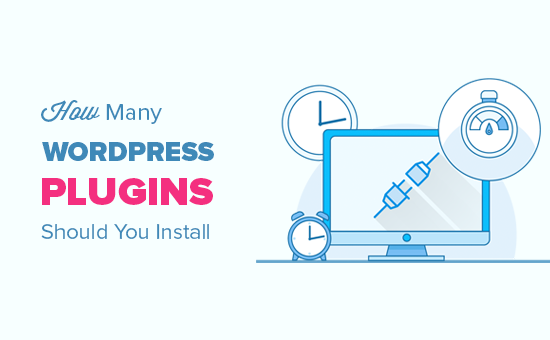
About WordPress Plugins and How They Work
Before we dig deeper, let’s talk a little bit about WordPress plugins and how they work.
WordPress plugins are like apps for your website. They help you add new features and website functionality such as making an online store, adding contact forms, and more.
Like WordPress itself, plugins are also written in the PHP programming language. PHP code runs on your website’s hosting server and utilizes its resources.
This is why you must choose a good WordPress hosting company that gives you easy tools to manage those resources and run your website efficiently.
To learn more, see our detailed guide about how WordPress plugins work. If you want to dig even deeper, then take a look at how WordPress actually works behind the scenes (Infographic).
Ever since WordPress 1.2 (when support for WordPress plugins was added), plugins have been a blessing for users. WordPress without plugins is like a toy store with no toys. That’s no fun.
Why are Plugins Essential for WordPress Websites
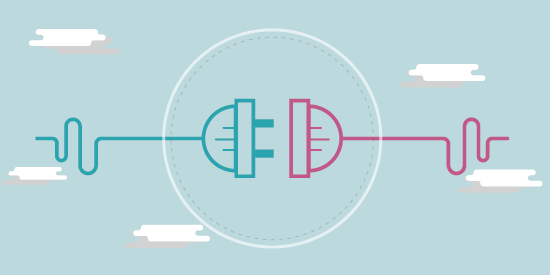
Even though the WordPress core provides a strong publishing framework, it is the plugins that are widely responsible for making WordPress the most popular website builder in the world.
The number of total WordPress plugins available has grown over the years. At the time of writing this article, there are more than 60,000 free WordPress plugins available in the official plugins directory.
Apart from these free plugins, there are also thousands of premium WordPress plugins sold by third-party companies and developers.
Plugins can help you improve SEO, increase security, manage users, and more. It would be quite difficult to grow your business without using WordPress plugins on your website.
How Did WordPress Plugins Get a Bad Reputation
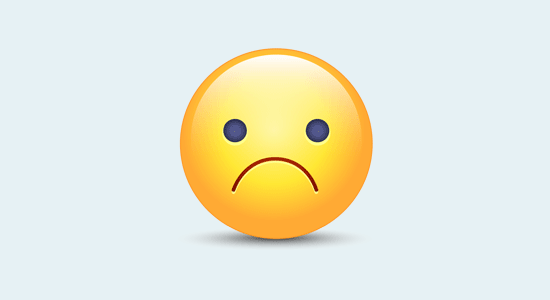
The purpose of plugins is to extend WordPress to do almost anything you can imagine. However, now we see a sense of fear or restraint towards plugins from many beginner users.
People get worried about performance, security, reliability, etc. This is mainly because designers, developers, and web hosting support technicians get really frustrated when they are troubleshooting a client’s websites.
In their frustration, they make comments like ‘have fewer plugins‘, or ‘it is the plugins that are slowing down your site‘.
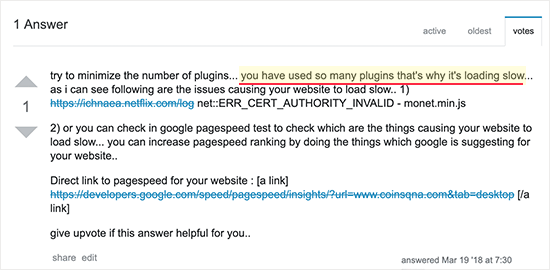
These statements have resonated throughout social media, in-person meetups, and conferences. The biggest issue with those statements is their ambiguity.
What is less? How many WordPress plugins are too many?
We believe the problem is not the quantity of plugins, but rather the quality.
You can have dozens of good WordPress plugins running on your website without any issues, but an addition of a single poorly coded plugin can slow down your website.
When this happens and you ask for troubleshooting help, your hosting company support technician or another developer will blame the quantity of plugins.
This makes sense because troubleshooting a website with 5 plugins is much easier than troubleshooting a website with 30. Quantity of plugins make their job harder.
It’s extremely important to take any such advice resulting from frustration with a bit of caution.
You should politely ask them to identify which specific plugin is causing the issue because simply blaming the quantity is a result of laziness.
To put this in perspective, our WPBeginner website has 62 active plugins right now, and it loads extremely fast.
If we were to add one bad plugin that slows down the website, then we should only have to disable that one bad plugin (not all 62).
With that said, let’s take a look at how plugins can affect different aspects of your website.
How WordPress Plugins Impact Website Speed & Performance

There are many different types of WordPress plugins, and they each impact your website performance differently.
There are plugins that affect mainly the front-end. For example, page builder plugins, contact forms, galleries, sliders, etc.
Then there are plugins that are mainly made to perform tasks within the back-end or admin area. For example, WordPress backup plugins, editorial plugins, various background processes, etc.
There are also plugins that run everywhere including admin area and front-end. For example, SEO plugins, WordPress firewall plugins, and more.
A WordPress plugin’s impact on website speed and performance depends on where that plugin is being loaded.
For example, plugins that are only loaded when you are doing specific tasks in the WordPress admin area usually will not impact your website’s performance.
On the other hand, plugins that are loaded on the front-end are likely to have a larger performance footprint.
Also plugins that perform routine background processes like broken link checking, 404 monitoring, etc can also significantly slow down your overall website performance.
Plugins can impact your site performance by:
- Making additional HTTP requests – Some plugins (mainly front-end ones) may require custom styling or scripts to work properly. Because of this, they may add extra JS and/or CSS file(s). Loading these files require making additional HTTP requests which slows down your page load time.
- Additional DB Queries – Some plugins may increase your database queries. For example, plugins to display popular posts, related posts, or anything else that pulls database elements and displays it on the front-end.
- Background Processes & Database Writes – Some plugins can take up a lot of server resources while running background processes such as checking for broken links, monitoring and recording analytics like post views, etc.
Most good WordPress plugins will only load additional files when needed, and they will minimize the database calls. However, sometimes it is just unavoidable.
Luckily, there are optimizations available for most cases. Let’s take a look at a short term and a long term fix for these issues.
Before we do this, first make sure that you have caching enabled on your WordPress site. Without caching, your website will always be slow.
Now, let’s move on to other optimizations.
Fixing Additional HTTP Requests Issue
Plugins have to add additional HTTP requests (i.e JS and CSS file) to work out of the box. For example, when you install a contact form plugin, you want it to work and look good too.
People complain about additional HTTP requests while ignoring that they are sometimes necessary. Here is what an unstyled form would look like.
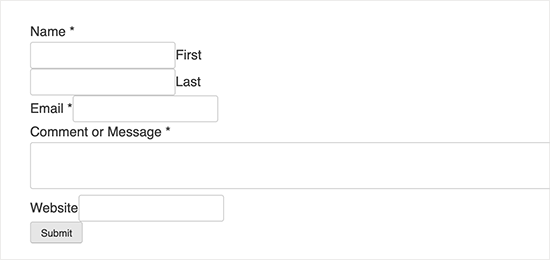
Most users would not like it, some would even think that it’s broken. Well, that is exactly what would happen if the contact form doesn’t add the additional HTTP requests to load CSS and JS files.
In short, the additional styles and scripts are needed for the plugin to function properly.
There are three ways to optimize the additional HTTP requests issue. All of them require some coding knowledge and WordPress know-how, but one will method is definitely easier than the others.
The first method would be to unregister the additional styles and scripts that are being loaded by the plugin. After that you can combine the plugin styles into your theme’s style.css file and combine the plugin scripts into your theme’s main JavaScript file.
The second method would be to conditionally load the plugin styles/scripts on pages where they are needed.
We have already explained both methods in our article about disabling additional scripts and stylesheets that WordPress plugins add.
As for folks who are not code-savvy, you can use a premium caching plugin like WP Rocket which allows you to minify and combine files with a single click. This will work for most cases, but in some cases it can cause conflicts with specific plugins.
With that said, you must understand that a few additional HTTP requests are not as significant as you may think. We are talking about milliseconds here. However if you have a lot of plugins that are adding additional HTTP requests, then this optimization will allow you to shave a few seconds off your load time.
A lot of non-techy business owners simply hire a WordPress developer to speed up their website (which is a worthwhile investment).
Now that we have covered HTTP requests, let’s take a look at additional DB queries.
Fixing Additional Database Queries and Background Processes
Some plugins may increase the load on your database server. WordPress itself does a very good job at caching the queries and most well-coded plugins will not cause any significant issue.
However, if you have a high traffic website, then using database-driven plugins can become an issue especially if you don’t have proper server resources.
For example if you have a membership website or an online store with WooCommerce, then you are serving a lot of uncached requests. In this scenario the only real option is to use a managed WordPress hosting solution or even a specialized WooCommerce hosting solution.
Now there are some plugins that are extremely resource intensive, and you should avoid them at all costs.
For example, there are plugins that add various analytics functionality within WordPress such as some email opt-in plugin, website stats plugin, post views tracking plugin, etc. These plugins inefficiently write to the database on every page load which can significantly slow down your website.
You can track analytics in a more scalable manner with plugins like Google Analytics for WordPress by MonsterInsights or Jetpack Stats.
You can add email opt-in forms with more scalable tracking with plugins like OptinMonster or by using signup forms from your favorite email marketing services.
There are also plugins that monitor 404 errors and track broken links which can add heavy load and overwhelm the server resources. Instead of using those plugins, you should use a third-party cloud services like Ahrefs or SEMRush that automatically track broken links and offer a lot of other useful SEO insights as well.
If you don’t want a premium solution, then you can use a free tool like Broken Link Checker by AIOSEO. It lets you scan up to 200 internal links to make sure they’re working correctly.
How WordPress Plugins Impact Security

Security is another major concern when it comes to installing WordPress plugins. Many users worry that having more plugins can make their site more vulnerable.
It is true, that a poorly coded WordPress plugin can be exploited by hackers and make your site vulnerable. However, it is also true for just about every software that exists.
Oversights are bound to happen. However, the best part about open source is that many people are using the software, which makes it faster for a vulnerability to be discovered and fixed.
You can keep your website secure by using a WordPress security plugin like Sucuri. They scan thousands of websites and will help you catch most security problems with a vulnerable plugin.
You can also protect your website by improving your overall WordPress security. This allows you to add layers of security before any vulnerability can be exploited by hackers.
WordPress Plugins and Reliability
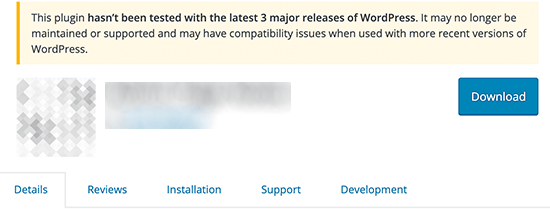
Some folks are concerned about a plugin’s reliability. What if the plugin gets discontinued? What if the updates are slow?
The beautiful part about the open source WordPress ecosystem is that there are always alternatives.
If you use a popular plugin, chances are that it will not be discontinued. If it is, then someone else will likely fork it and continue the development. That’s the power of open source. This is also how WordPress came into existence (previous platform was called b2/cafelog).
As long as you pick plugins with a good track record and reputable authors, then you will be fine.
Can I Avoid Plugins by Adding Code Snippets?
There are articles throughout the web that shows you: “How to do XYZ in WordPress without a plugin” (like this one).
The purpose of these articles is not to discourage using plugins but to show you how to learn code. There are basically three ways you can add code snippets to your site. You can add them to your functions.php file, a site-specific plugin, or use a plugin to add custom code snippets.
Regardless of which method you choose, adding code snippets to your website has the same performance impact as a stand-alone plugin.
If you install code snippets that are identical to a plugin, then basically you are running the plugin without installing it. The downside is that you won’t get any plugin updates or security fixes for that code.
However, if you want to add many customizations to your site, you can replace several stand-alone plugins by using WPCode, the best WordPress code snippets plugin.
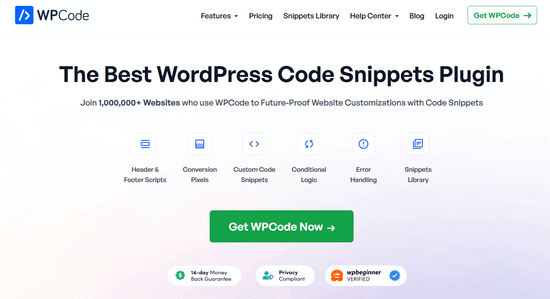
WPCode makes it easy and safe to add custom code in WordPress, without needing to edit your theme’s functions.php file.
You can manage all of your custom code snippets from one central screen. Plus, you can safely switch WordPress themes without losing your important website functionalities.
WPCode Pro comes with a private cloud snippet library, scheduled snippets, conversion pixels, and more. There’s also a free version of WPCode you can use to get started.
For more information on this topic, see our guide on WordPress plugin vs functions.php file which one is better.
How Many WordPress Plugins Should You Install? How many WordPress Plugins are too many?
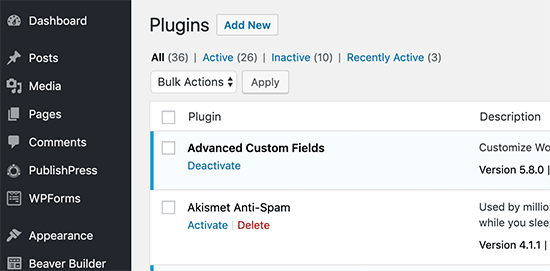
You should install as many WordPress plugins as necessary to run your website and grow your business.
On average, its quite common for a business website to have at least 20 – 30 plugins.
If you’re using WordPress to it’s full potential and have many advanced features, then this count can easily go into 50+.
For example, here’s the number of active plugins on our websites:
- WPBeginner – 62 active plugins
- OptinMonster – 67 active plugins
- WPForms – 54 active plugins
- MonsterInsights – 68 active plugins
- Syed Balkhi’s blog – 42 active plugins
- RafflePress – 17 active plugins
- WP Mail SMTP – 39 active plugins
These count should highlight that it’s not the quantity of plugins that slow down your website.
You will be fine with a large number of plugins, as long as you are using high-quality plugins that follow the WordPress coding standards.
How to Pick the Best WordPress Plugins
One of the most frequently asked question by our users is ‘how do I choose the best plugins for my website?’
If you are looking for a free plugin, then only download it from WordPress.org plugin directory. The official WordPress plugin directory also makes it easier to choose good plugins.
You can see a plugin’s rating and reviews provided by other WordPress users. You can also see when the plugin was last updated and how many websites have it installed.
On the other hand, if you are looking into a premium plugin, then make sure they are from a well-reputed WordPress company or developer. If you are unsure, then look around for reviews and testimonials.
For more details, see our complete guide on how to choose the best WordPress plugins.
If you are just starting out, then see our expert-pick of the essential WordPress plugins that every website should have. You can also check out WPBeginner’s WordPress plugins category where we regularly share the best WordPress plugins and how to use them.
We hope this article answered your questions about how many WordPress plugins should you install. You may also want to see our article debunking the most common WordPress myths, or our expert picks of the best business phone services.
If you liked this article, then please subscribe to our YouTube Channel for WordPress video tutorials. You can also find us on Twitter and Facebook.





Gary Jones
Great article! As someone who has been designing multiple sites for some thirty years now, and in other countries as well, I find it very frustrating that whenever there is an issues your hosting company, of which I’ve used almost twenty by now, will always say to disable all your plugins and reenable them one at a time to see what’s causing the problem. Not helpful. The other issue is being very careful about plugin support. Obviously don’t install any plugin that hasn’t been updated for a long time. Also ones that have zero support, of which there are many. Even with what looks like good support on very popular plugins they are often useless. I had numerous issues on The Events Calendar with some simple issues, but got nowhere. My Foo Gallery, a popular gallery plugin, doesn’t sort photos alphabetically, and it’s now been over two years since they said they would fix it. Frustrating!
Brijesh Parikh
How to determine quality of a plugin?
WPBeginner Support
Without coding knowledge the best ways to get an idea of the quality of a plugin would be to check for plugin ratings, ratings of the company that created the plugin, and reviews of the plugin.
Admin
Samuel
insightful, i have often feel that much plugin on your website will lead to slower Word Press Site. This article has demystify my fears. I want to say that before installing any plugin it is always good to check other users rating of the plugin before buying or installing it. Still any plugin installed should be through tested to see how it impact your website’s performance. Thank you so much, I learned a lot from this article.
Dayo Olobayo
I’m always hesitant to install new plugins because I worry about them slowing down my site. But this article makes a good point that well-coded plugins shouldn’t be a problem. I’ll have to be more mindful of the quality of the plugins I install in the future.
Mrteesurez
Coming across this article make me understand more facts about WordPress plugins.
One is that: Installing potential code snippet is like running a plugin with out installing it.
The repercussions fears me:
“The downside is that you won’t get any plugin updates or security fixes for that code”.
Initially thought I have installed too many plugins, but I now discovered that I have not.
Jiří Vaněk
I have about 31 plugins currently active on my site and I’m still in the green according to google search console as well as gt metrix and pagespeed insight. But I choose quality plugins and I also have the advantage of my own server for the entire website. So I don’t have to worry about the performance, which is now somewhere around 20% of the ram memory. Even so, I had a bad feeling about having many plugins. However, after reading this article I see that 30 plugins is a relatively normal amount if they are good. Thank you for this article. At least now I know that the number of plugins I have is not so terrible and that it is, on the contrary, a relatively common number.
WPBeginner Support
Glad we could help clear up the misconception about the number of plugins
Admin
Moinuddin Waheed
This phrase that plugins cause websites to slow down, I myself have repeated several times and was not aware of the fact that it’s not the number of plugins but the quality of plugins that we choose.
it is good to see you have disclosed how many plugins wpbeginner uses on its website.
we could ever guess it to 20 not more than that but having that much plugins and loading in less than half a second is a testament in itself about plugin myths.
Thanks for clearing the doubt.
WPBeginner Support
Glad we could clear up the common confusion
Admin
Ralph
WPBeginner runs 62 plugins? WOW! This website is so fast I’m actually speechless.
I was thinking you guys run 10-15 plugins like AIOSEO and WPForms that can do a lot of things rather than a lot of small plugins. I don’t even know 25 plugins that I would like to use.
You guys really know what you are doing!
Jiří Vaněk
There is an article on the entire wpbeginner site infrastructure here on the site. It is not one server but several in a cluster solution together with cache servers. That’s why the site is so fast. And I don’t think it was that simple considering the number of users. You can find the article at this address: https://www.wpbeginner.com/opinion/how-we-made-wordpress-faster-than-static-site-generators-case-study-speeding-up-wpbeginner/
NAON
Oh very well. Thanks so much!
This is the answer that i had to understand.
WPBeginner Support
Happy to hear we could clear up some common misunderstandings
Admin
Bilikis
Fantastic Post! Thank you for the post, It was really useful to me, I have always wanted to add more plugins to my site but was scared of speed slowing down.
Now I can add useful plugins to my site without any worry.
WPBeginner Support
Glad you found our recommendations helpful!
Admin
Vikash Pareek
I have a simple question that how many plugins are there on https://www.wpbeginner.com/ because the speed of this site is amazing,
One more thing, how can I increase the speed of my blog website, please tell a better formula…….
Thanks in advance
WPBeginner Support
We cover how many plugins we’re using in our section “How Many WordPress Plugins Should You Install?” and for how to speed up a WordPress site, we would recommend taking a look at our article below:
https://www.wpbeginner.com/wordpress-performance-speed/
Admin
White Cloud
Thanks! I currently use 56 plugins on my blog,but my blog loads quickly.My friend always says that there are too many plugins on my blog,so I can show him this post.
WPBeginner Support
Glad our opinion on this can be helpful
Admin
safik pm
So how can I find the plugins causing the issue? is it can find without the help of a developer?
WPBeginner Support
It would depend on the specific issue you are running into but for most issues, you can disable plugins until the issue is resolved for finding the problem plugin.
Admin
james
Thanks for this article. I read it very interesting because I just want to know how much is enough. I currently use 40 plugins on my website.
Francisca
Amazing !!! thanks for all the information.
WPBeginner Support
Glad you found the guide helpful
Admin
Peter
Nice article…very helpful
WPBeginner Support
Glad our guide was helpful
Admin
Anjali Pillai
So the Sucuri plugin for site security will not slow down the site right?
WPBeginner Support
The plugin should not have a large effect on your site’s speed.
Admin
J-M
I have started experiening some issues with my site, for example a page will not load when all my plug-ins are loaded. I’ve tried to troubleshoot the problem to 1 plugin – however the issue seems to only occur when I have more than 45 plug-ins installed – whatever they may be. Any advise?
WPBeginner Support
You would need to manually disable/enable plugins to find the specific conflict or another option would be to reach out to your hosting provider to see if they see any specific errors on their end for your site.
Admin
LiquidFool
How many security plug ins would your recommend?
WPBeginner Support
Unless the security plugins say they work together, we would only recommend one to prevent conflicts.
Admin
Evie
Thanks for all the awesome information you guys post! I have just learnt Wordpress this year and found it so overwhelming initially. Your articles are so well written and easy to understand and I have just created my first site! Yay
Thanks again everyone
WPBeginner Support
You’re welcome, glad our content has been helpful
Admin
Titu Das
Thank you so much for sharing the article!!
WPBeginner Support
You’re welcome
Admin
Vandana
When you inherit new websites, there are some plugins that are active but are not in use. Is there any quick way of finding out which plugin is being used or do you have to deactivate a plugin and check the frontend to see if there is any difference?
Thanks!
WPBeginner Support
There is no easy way to check sadly and you would need to manually disable the plugins one at a time
Admin
ashish
as you said about poorly coded plugins are the major cause of slow loading of your whole site. my question is simple. How to get known from a plugin that it would be right or should I go for another one! because we can’t get info about every plugin on google we shall be going to use. please reply
WPBeginner Support
That would require some coding knowledge and testing, we do not have a recommended simple way to test the quality of plugins at the moment for beginners.
Admin
Andre
Rather interesting article seeing I’ve always been concerned about the amount of plugins running, but that’s been resolved thanks to the explanations in the article.
My concern will now thus be quality rather than quantity…
WPBeginner Support
Glad our article could help clear up the misconception
Admin
Noah P.
I think a list of the 62 plugins that wpbegginer.com uses would be very beneficial for users.
WPBeginner Support
For what we’re using on our site, you would want to take a look at our Blueprint page here: https://www.wpbeginner.com/blueprint/
Admin
Asmat Ullah
Very informative article ..every WP developer must read it to avoid misconception about.. the question .. how much plugin……
WPBeginner Support
Thank you
Admin
s sah
wpbeginner is really helpful to beginners. Thank you so much for great articles.
WPBeginner Support
You’re welcome, glad you’ve found our content helpful
Admin
Friska Titi Nova
Thank you so much for the article! I am relieved! Keep on working for more inspiring writings for us, the beginners! :*
WPBeginner Support
You’re welcome, glad our content could help
Admin
C. Anderson
Just wanted to make you aware of the fact that quite a few of the plugins you recommend are disallowed by WPEngine. This was confusing to me as a beginner. At your recommendation I installed them, like W3Total Cache and WordFence but then got an email from WP Engine that I had to uninstall them within 7 days. This was a bit tough for me as an WP Beginner!
MyRealName
guys I love you. you just made my day.
Nati
Great important content! Many thanks
Haydrion Rayel
wpbeginner has 53 ? Ow .. I have only 5 plugins ..
Kadoon
Very nice breakdown about plugins.
All this is new to me and I have recently been studying about how to set up a WordPress site for my affiliate marketing; I have learnt about web-hosting, domain names, and now plugins. Just so much to learn that I don’t even know where to start or what questions to ask at the moment.
I need general advice. Can I get any?
Will be looking forward to a response. Thanks.
jaswinder Kaur
I have seen that by using too many plugins is not good for the site. So I am deleting some of them.
Danstan
I have 63 plugins and everything is just fine though I really don’t want to go past that. Haven’t had an issue before. Trust me, like he said, choose great plugins, everything will be good all the time. Good luck!
jerry
Thanks! This was great info and great comfort to a WP beginner like me!
Vitaliy Kolos
I still think you don’t want to really go overboard with the amount of plugins because the more plugins you add, the more vulnerable your site gets. That’s because some plugins are either not designed properly or designed so deliberately.
Even if you have a plugin in your dashboard and it’s inactive, malicious hackers can still take advantage of that.
Ileane
Hi Syed, I saw you link to this post from a comment you left on Ian’s blog.
My question is this – since I’m not familiar with code, when I install a plugin and something breaks, how can I possibly know for sure which plugin is poorly coded.
For example, I know that we can troubleshoot by removing all the plugins and putting them back one by one. butt that doesn’t really tell me for sure which one is poorly coded because it might just be the new one that I added and not any of the old ones.
Also – there’s always a change that the theme is the problem too. I had problems with Thesis theme and every time I would install a lead capture plugin my RSS feed would become invalid. I tried Optin Skin, Optin Monster, Hybrid Connect, and so many others that I can’t even remember them all. But to this day I never found out which one actually caused the issue.
Editorial Staff
Hey Ileane,
Evaluating the code and performance of the plugin does take some technical know how.
This plugin is a good place to start:
http://wordpress.org/plugins/p3-profiler/ << Some hosts aren't configured for this plugin, so if you don't see any results, then that's the reason. Also bloated themes with a lot of code in their functions.php file can cause problems. Remember the codes in functions.php file are similar to plugins. As for your question about new and old plugins... If any of the new plugins that you mentioned you had tried for Optins and none of them worked, then I'll lean towards that the problem is with your older plugins or theme rather than the new ones. Also important to know that sometimes it could be a conflict between two plugins or plugin and a theme. So you always have to be open to trying things out. I know disabling plugins and debugging on a live site sounds scary. That's why my suggestion would be to create a staging environment. Then test the plugins you have installed with the default theme. If the problem goes away, then you know it is your theme that's causing the problem. If not, then try the plugins. Remember if multiple different "new" plugins cause the same conflict on your site, then it is very likely that the problem is specific to your site and setup. You can also try using the wp_debug function to see how many errors are being returned. Do this on local server environment or on a staging environment. This will give you an idea on what needs to be fixed. I wish I could give you an easier answer, but with the wide-variety of plugins out there coded from the wide-variety of developers all with different skill level, it's impossible to give a simple answer. -Syed P.S. Here's the staging tutorial: https://www.wpbeginner.com/wp-tutorials/how-to-create-staging-environment-for-a-wordpress-site/
Admin
Ileane
Thanks Syed!!
I use the P3 Profiler Plugin and it was really helpful. I got rid of a ton of plugins based on the heavy load times and poor performance.
I need to set up the staging environment and do some testing. Do you offer a service for that?
Thanks again for your response!
Huguens M
What a relief… before reading this article I was totally confused about this subject. You guys are awesome. The burden has now been lifted. Wooooohhhhhhhhhhhhhhhhh!!
Ranjeet kumar
Thanks for this article. This is too good!
Dave Bell
A great article. Really helps clarify what the real issues are. I noticed myself becoming paranoid about plugins. 10 or 11, oh my! Now I feel the pressure is off. Of course good solid properly coded plugins are the order of the day. Dave
Patricio Proaño
Excellent article, very usefull!
Kenny Dowling
Thank you. A very useful and informative article which counters opinion based guidance I have read in some well known books.
And I agree with Waqas Lone above.
Rambo Ruiz
Hey thanks for clearing this up I too have been wondering if too much plugins will make my site load slower. Great to know that it won’t
Frank Woodman Jr
Thanks for what clearly is the best article explaining WordPress plugins and how to use them that I’ve seen. And you’ve done it in an easy to understand and follow manor that even the newbies can follow along.
This is one article that I’ll both bookmark and share as it’s truly a wonderful resource.
Martin
Sometimes you can cut a long story short:
1. Install only plugins you are going to use, do not leave them deactivated, delete them in this case.
2. Install f.ex. 6Scan security Plugin to see whether the plugins you are using are compromizing your site’s security and deal with them appropriately.
3. Offer links to sites who can meassure your sites loading performance http://tools.pingdom.com/fpt/
4. install plugins like Wordfence and WP Firewall2 for neccessary protection of your site. Here we are not only talking plugins, themes can have the same security problems.
Thank You
Editorial Staff
Well if two parties are on the same page, you can do that. However, when you are trying to educate others regarding the issue, then it is best to be thorough.
Admin
Waqas Lone
Well you guys have done a really good job by explaining all this. Not everyone understand the reason behind it + many people like more in-depth analysis into everything which is IMPORTANT Great article!
Frank Woodman Jr
Appreciate your additional input and it sounds like you’ve give us some good advice.
lulu
well i agree about making this article a 50 word article but for beginners it is better to be presented the way the author did. The article gives REASSURANCE. And believe me, we, the beginners, have to deal with ALOT of scary unknowns.
Charlie
I have about 450 plugins installed on one of my multi-site networks. Obviously not all activated on the same site. I find the P3 (Plugin Performance Profiler) plugin is a good way to see which plugins are causing any issues.
Mladen
Thanks for this article. It was very interesting for me reading it, because i was just wondering how much is enough. Currently i am using 40 plug-ins on my site.
Alex Denning
Really solid advice there – especially not the number, the quality – WPBeginner is proof of that itself